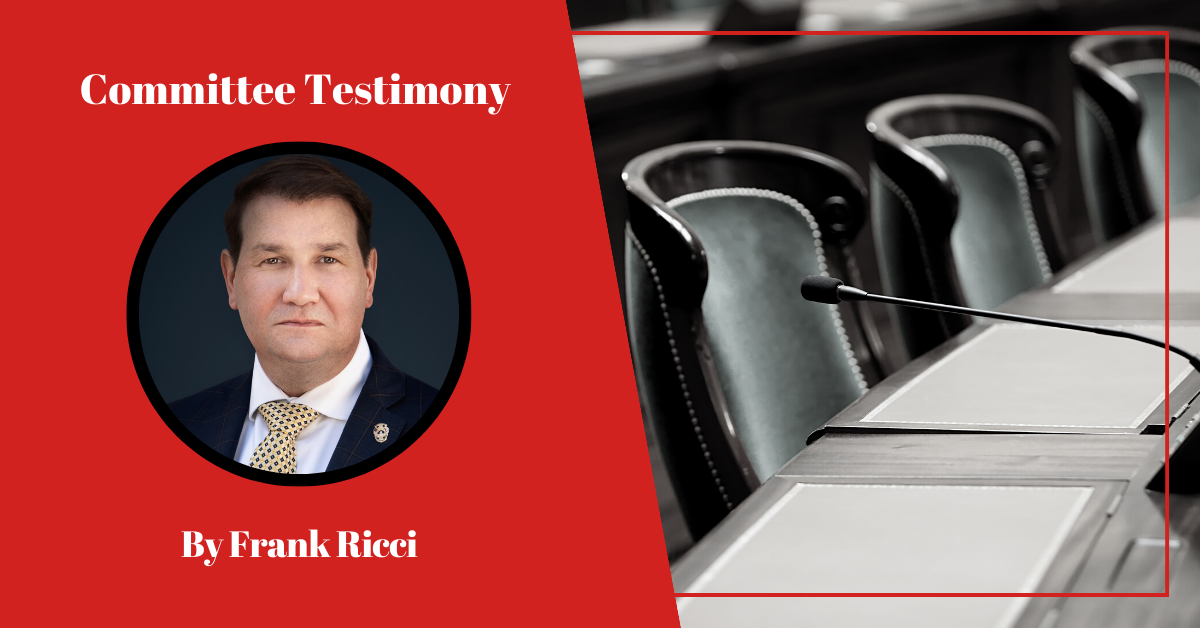Submitted by Frank Ricci, Labor Fellow
March 7th, 2024
My name is Frank Ricci and I serve as Yankee Institute’s Labor Fellow. Yankee Institute, a non-profit public policy organization in Hartford dedicated to empowering Connecticut residents to forge a better future for themselves and their families.
Yankee Institute opposes SB 334 which requires, “municipalities employing police officers and firefighters provide such officers and firefighters with pensions through the municipal employees’ retirement system or another system that offers comparable or superior benefits.”
First responders risk injures and death placing your safety above their own. Firefighters and our police officers, who would make their spouse a widow and their children parentless for the community they serve, deserve to be treated with dignity and respect.
However, this bill is not about dignity and respect it is about passing another unfunded mandate on to the taxpayers without regard for property taxes or the current law.
Our state has some of the most robust collective bargaining laws in the nation that our first responders are already included under. In fact, this legislative body previously passed the Municipal Employee Relations Act (MERA) — which includes binding arbitration where unions and management can adjudicate any impasse.
This bill is a solution in search of a problem. In 2019, the town of Branford, through the bargaining process, proposed and enacted a restoration of defined benefit pension plans for police officers. Town management and the police union negotiated in good faith and came to an agreement that would enhance the police force’s ability to hire quality candidates, in balance with local taxation. This outcome demonstrates how the process should work and demonstrates why this type of legislation is unnecessary and would be costly for taxpayers.
In another example, the City of West Haven is currently increasing pay and restoring pension benefits after seeing a mass exodus of qualified police officers. However, despite trends each local municipality should not be handcuffed with blanket mandates made from far away at the Capitol without considering the unintended consequences on local budgets.
Collective Bargaining Agreements are made close to the issues often yielding positive results with full knowledge of local budget constraints and the needs of the community which allows negotiators to balance the interests of workers and the taxpayers.
Other fire department and police departments have agreed in good faith negotiations to accept the benefit package – based a multitude of factors and voted on by their members after being formally negotiated with the municipality – that did not result in an arbitration award.
Now, instead of returning to the bargaining table this bill seeks to flip the table on the taxpayers in a bad faith attempt to circumvent the very agreements they negotiated.
Think if you sold your home and the buyer agreed to a price. After having buyer’s remorse, they lobbied the legislature to retroactively reduce the amount they are required by law to pay you. We wouldn’t accept that type of intervention under those circumstances, and we should not accept it here. Furthermore, all collective bargaining agreements have a finite number of years outlined in the duration clause that allows the union to take another lawful bit at the apple if they think corrections need to be made.
Lastly, this bill demonstrates an even more pernicious phenomenon: A trend where union leaders circumvent the bargaining table altogether, and instead rely on political horse trading at the Capitol, far removed from any transparency or accountability from local taxpayers.
Although this bill is well-intentioned, and as a former firefighter union president who negotiated and advocated for pension benefits, I am empathetic to the needs of the first responder community. However, that was through the collective bargaining process that was established under law— where management and labor through an adversarial process balance the interests of labor, management, and the taxpayers. Management when it negotiates understands the budget implications of those agreements.
In this case this mandate is being made far away in Hartford resulting in another unfunded mandate passed down to municipalities without regard for the taxpayers. Yankee Institute encourages the Planning and Development Committee to vote no on SB 334. Thank you for the opportunity to provide testify before this distinguished committee.
Frank Ricci
Labor Fellow
Yankee Institute
203-285-4907

